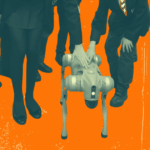Drone Wars: Pilots reveal debilitating stress beyond virtual battlefield
livescience.com
“To extinguish a person’s life is a very personal thing. While physically we don’t experience the five senses when we engage a target — unlike [how] an infantryman might — in my experience, the emotional impact on the operator is equal.”
In the final years of his nearly 30-year career in the U.S. Air Force, Slim spent 10 to 12 hours a day in a cool, dark room in the Arizona desert, stationed in front of monitors that beamed back aerial footage from Afghanistan.
Slim’s unit operated around the clock, flying Predator dronesthousands of miles away over Afghanistan, to monitor — and sometimes eliminate — “targets” across the war-ridden country. As a sensor operator for these remotely piloted aircraft, or RPAs, it was his job to coordinate the drones’ onboard cameras, and, if a missile was released, to laser-guide the weapon to its destination.
These types of missions are part of the military’s expanding drone program, which has developed a reputation for carrying out shadowy and highly classified operations — ones that sometimes blur legal or moral lines. As such, their use in warfare has been steeped in controversy. [How Unmanned Drone Aircraft Work (Infographic)]
Critics say firing weapons from behind a computer screen, while safely sitting thousands of miles away, could desensitize pilots to the act of killing. What separates this, they argue, from a battlefield video game?
But war is rarely so simple, and distance does nothing to numb the emotional impact of taking a life, said Slim (who is referred to here by his Air Force call sign in order to protect his identity).
“People think we’re sitting here with joysticks playing a video game, but that’s simply not true,” Slim, who retired from the Air Force in 2011, told LiveScience. “These are real situations and real-life weapons systems. Once you launch a weapon, you can’t hit a replay button to bring people back to life.”
See more: risks, drones, ethics, mental health










